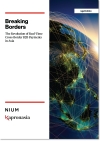Latest Insight
- Why an expected APAC fintech consolidation wave has yet to come
- Why cash is still prevalent in Asia
- Japan steps up green finance efforts
- South Korea charts middle path on crypto
- Should Grab and GoTo merge?
- Singapore pushes ahead with fintech-driven sustainability
- Digital banks in South Korea continue to thrive
- Billease is the rare profitable BNPL firm
- Fintech sector in Pakistan faces mounting challenges
- Where digital banks in Asia can make a difference
Latest Reports
-
Breaking Borders
 Despite progress in payment systems, the absence of a unified, cross-border Real-Time Payments (RTP) network means that intermediaries play a crucial role in facilitating connectivity. This report examines the ongoing complexities, challenges, and initiatives in creating a seamless payment landscape across Asia. Innovate to Elevate
Despite progress in payment systems, the absence of a unified, cross-border Real-Time Payments (RTP) network means that intermediaries play a crucial role in facilitating connectivity. This report examines the ongoing complexities, challenges, and initiatives in creating a seamless payment landscape across Asia. Innovate to Elevate In the dynamic and diverse financial landscape of the Asia-Pacific (APAC) region, banks are at a pivotal juncture, facing the twin imperatives of innovation and resilience to meet evolving consumer expectations and navigate digital disruption. Catalyzing Wealth Management In The Modern Era
In the dynamic and diverse financial landscape of the Asia-Pacific (APAC) region, banks are at a pivotal juncture, facing the twin imperatives of innovation and resilience to meet evolving consumer expectations and navigate digital disruption. Catalyzing Wealth Management In The Modern Era Hyper-personalized wealth management presents a paradigm shift from traditional models relying on static, generalized segments. Developing tailored investor personas based on psychographics, behaviours and fluid financial goals enables financial institutions to deliver rich and tailored customer experiences that resonate with next-generation priorities.
Hyper-personalized wealth management presents a paradigm shift from traditional models relying on static, generalized segments. Developing tailored investor personas based on psychographics, behaviours and fluid financial goals enables financial institutions to deliver rich and tailored customer experiences that resonate with next-generation priorities.
Events
| October 21, 2024 - October 24, 2024 Sibos Beijing |
| November 06, 2024 - November 08, 2024 Singapore Fintech Festival |
The “Notice on Government-set Prices and Government-Guided Prices for Commercial Banking Services”, published by National Development and Reform Commission (NDRC) and China Banking Regulatory Commission (CBRC), is effective on August 1st, 2014.
China is beginning to open its financial sector with the approval of three privately owned banks, extending the wave of financial reforms aimed at boosting China's changing economy.
At the start of this month, leading global supplier of information and communications technology (ICT) Huawei had joined the board of Europe’s 5G Infrastructure Association.
The recent news story about Bank of China allegedly assisting with illegal money transfer ended well for the bank and turned out to be a case of journalists not doing enough research...
Earlier this month, the US and China held their annual talks in Beijing, where they discussed trade, economic, regional, and political concerns.
Seven months after the PBOC's crackdown on bitcoin exchanges in China and we're seeing a resurgence in talk about what Chinese bitcoin exchanges are doing and where they are going. While accusations of falsifying trading data and questions about bitcoin's future in China still abound, China's bitcoin exchanges want to move on and forget the past, but are they going in the right direction?
Kapronasia's ATMs in China 2014 webinar and slides are now available in the webinar section of the website or by clicking here.
Despite the regulators’ effort in boosting investor’s confidence in post-hiatus IPOs, growth in Chinese stock market growth in trading volume is still sluggish.
Currently there are 637 companies on the IPO list in China and their prospectuses, published by the China Securities Regulatory Commission, reveal business intelligence, previously not available for public.
More...
We are pleased to announce the release of Zennon Kapron's book on the Past, Present and Future of Bitcoin in China. "Chomping at the Bitcoin" will be released on the 25th of August.
According to PBoC 2013 Annual Report, the payments industry in China is growing fast, 17% in 2013 alone and 25% on average in the last five years.
PBoC’s 2013 annual report shows that foreign banks in China showed steady growth and even outpaced GDP growth in terms of new deposits, but still lag their domestic competitiors.
The latest 2014 China Online Lending Industry Report reveals that China's P2P lending platform industry has grown rapidly both in terms of number of providers and turnover.
According to Wangdaizhijia, a resouce on the P2P industry in China, there are 148 P2P platforms in total closing, already closed or facing difficulties in redemptions.













